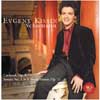Schumann - Piano Works
Kissin at full swing proves rather too much for Schumann’s introverted Romanticism
View record and artist detailsRecord and Artist Details
Composer or Director: Robert Schumann
Genre:
Instrumental
Label: Red Seal
Magazine Review Date: 11/2002
Media Format: CD or Download
Media Runtime: 60
Mastering:
Stereo
DDD
Catalogue Number: 09026 63885-2

Tracks:
| Composition | Artist Credit |
|---|---|
| Carnaval |
Robert Schumann, Composer
Evgeny Kissin, Piano Robert Schumann, Composer |
| Sonata for Piano No. 1 |
Robert Schumann, Composer
Evgeny Kissin, Piano Robert Schumann, Composer |
Author: Bryce Morrison
In common with his distinguished compatriots Moiseiwitsch, Horowitz, Richter and Gilels, Evgeny Kissin places Schumann at the heart of his already extensive repertoire. Certainly the First Sonata's extreme fluctuations, its sense of Romantic and incipient schizophrenia, appeals to a young virtuoso given to vividness rather than subtlety. Yet while Kissin captures much of Schumann's romantic turbulence, his often blistering rather than richly varied or subtly modulated sound, and his gaudy rubato can seem over-bearing: the reverse of inward, magical or self-effacing. The finale's scotch-snap rhythm commencing at 0'37" is fulsome rather than playfully tripping and its re-appearance is, again, rhetorical and exaggerated rather than un poco più lento as marked.
The same reservations apply to an even greater extent to Carnaval. 'Arlequin' may be vivo but it is hardly teasing or piquant, while 'Eusebius' pleads his cause for dreams and introspection strenuously and heavy-handedly. Piano, hairpin crescendo and sf advises Schumann in his contrasting 'Florestan', but Kissin is merely loud. Even when you marvel at his pace and command in, say, 'Pause' and 'Paganini', his attack seems excessive and out of perspective. 'Sphinxes' is thankfully omitted (written so that it should not be played, it remains among Schumann's more obvious jokes) but all the repeats are included in a performance where one hardly relishes such repetition. RCA's sound faithfully mirrors Kissin's aggression so that overall, although there are stunning moments, there are pages of something very different. Again, there is little to challenge the poetry and finesse of old-timers such as Cortot, Moiseiwitsch, Myra Hess or Géza Anda in Carnaval or Andsnes and, most of all, Gilels in the Sonata.
The same reservations apply to an even greater extent to Carnaval. 'Arlequin' may be vivo but it is hardly teasing or piquant, while 'Eusebius' pleads his cause for dreams and introspection strenuously and heavy-handedly. Piano, hairpin crescendo and sf advises Schumann in his contrasting 'Florestan', but Kissin is merely loud. Even when you marvel at his pace and command in, say, 'Pause' and 'Paganini', his attack seems excessive and out of perspective. 'Sphinxes' is thankfully omitted (written so that it should not be played, it remains among Schumann's more obvious jokes) but all the repeats are included in a performance where one hardly relishes such repetition. RCA's sound faithfully mirrors Kissin's aggression so that overall, although there are stunning moments, there are pages of something very different. Again, there is little to challenge the poetry and finesse of old-timers such as Cortot, Moiseiwitsch, Myra Hess or Géza Anda in Carnaval or Andsnes and, most of all, Gilels in the Sonata.
Discover the world's largest classical music catalogue with Presto Music.

Gramophone Digital Club
- Digital Edition
- Digital Archive
- Reviews Database
- Full website access
From £8.75 / month
Subscribe
Gramophone Full Club
- Print Edition
- Digital Edition
- Digital Archive
- Reviews Database
- Full website access
From £11.00 / month
Subscribe
If you are a library, university or other organisation that would be interested in an institutional subscription to Gramophone please click here for further information.




